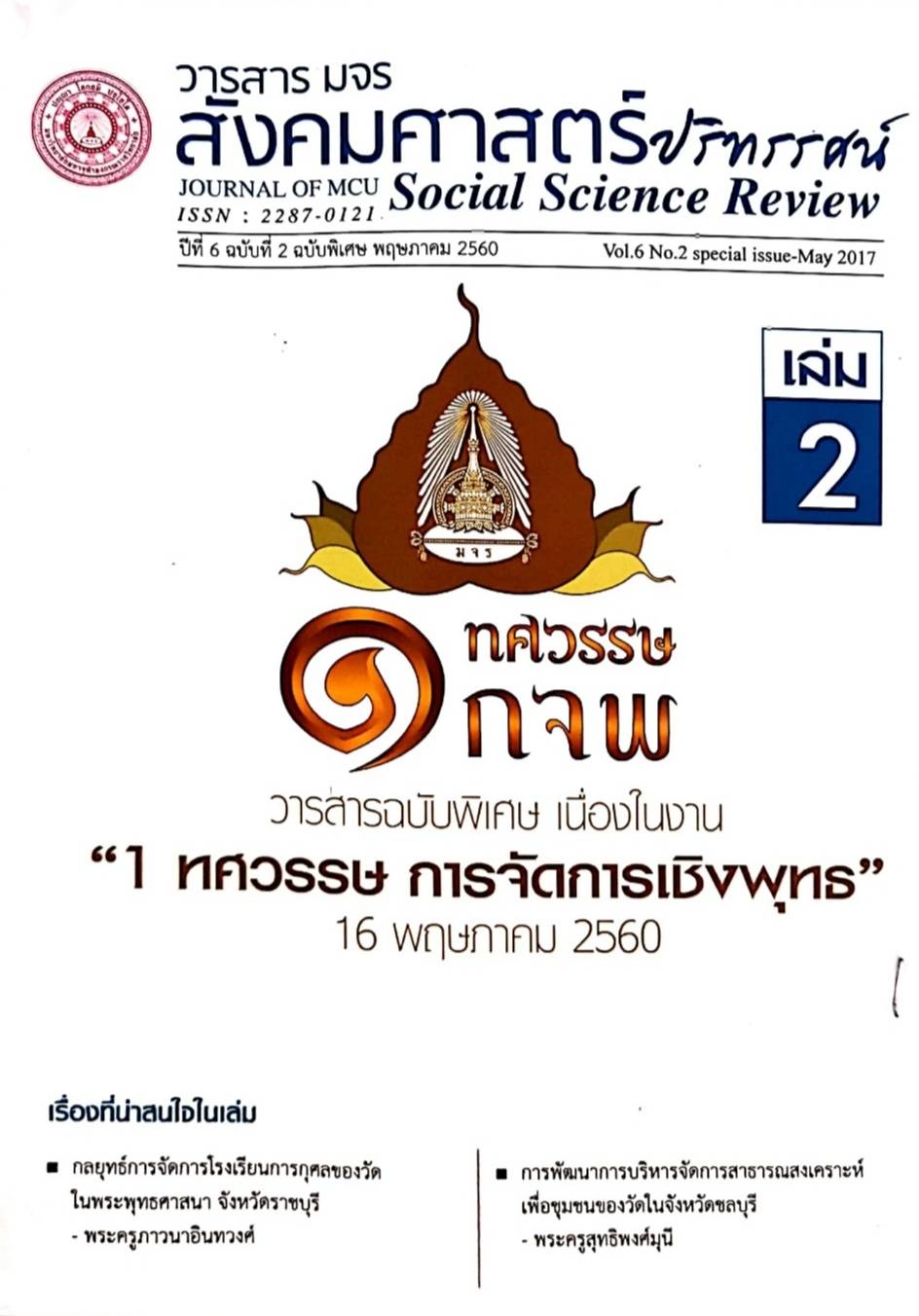ภูมิปัญญาการพัฒนาภาวะผู้นำในการบริหารจัดการวัด ของพระสังฆาธิการในอีสานตอนล่าง
บทคัดย่อ
ภูมิปัญญาการพัฒนาภาวะผู้นำในการบริหารจัดการวัดของพระสังฆาธิการในอีสานตอนล่าง มีความมุ่งหมายเพื่อ (1) เพื่อศึกษาความเป็นมาของภูมิปัญญาในการบริหารจัดการวัดของพระสังฆาธิการในอีสานตอนล่าง (2) เพื่อศึกษาสภาพปัจจุบันและปัญหาของภูมิปัญญาในการบริหารจัดการวัดของ พระสังฆาธิการในอีสานตอนล่าง (3) เพื่อศึกษาการพัฒนาภาวะผู้นำในการบริหารจัดการวัดของพระสังฆาธิการในอีสานตอนล่าง เครื่องมือที่ใช้ในการวิจัยได้แก่ แบบสัมภาษณ์แบบสังเกต แบบสนทนากลุ่ม ทาการเก็บข้อมูลเอกสารและข้อมูลภาคสนาม ข้อมูลภาคสนามได้จากการสัมภาษณ์ การสังเกต การสนทนากลุ่ม และจากผู้รู้ 12 รูป/คน ผู้ปฏิบัติ 63 รูป/คน และให้ข้อมูลทั่วไป 18 รูป/คน ในเขตจังหวัดนครราชสีมา บุรีรัมย์ และจังหวัดสุรินทร์ นาข้อมูลมาตรวจสอบข้อมูลด้วยวิธีการแบบสามเส้า วิเคราะห์ข้อมูลตามความมุ่งหมายที่ตั้งไว้ และนำเสนอผลการวิจัยโดยวิธีพรรณนาวิเคราะห์
ผลการวิจัยพบว่า ความเป็นมาของภูมิปัญญาในการบริหารจัดการวัดของพระสังฆาธิการในอีสานตอนล่างทำการวิจัยวัด 6 แห่ง ที่ประกอบไปด้วยวัดดอนขวาง วัดบึง วัดโพธิ์ย้อย วัดตาไก่พลวง วัดโมฬีวงษา และวัดจุมพลสุทธาวาส การเริ่มก่อตั้งของวัดมีมากกว่า 50 ปี และมีการจัดการด้านภูมิปัญญามาเป็นลำดับ ได้แก่ 1) ด้านค่าใช้จ่าย 2) ด้านบุคคล 3) วัสดุ อุปกรณ์ 4) อาคาร สถานที่ 5) การปกครอง สภาพปัจจุบันและปัญหาของภูมิปัญญาในการบริหารจัดการวัดของพระสังฆาธิการในอีสานตอนล่าง จากากรสัมภาษณ์ สังเกต สนทนากลุ่ม พบว่า สภาพของการจัดการวัดมี 5 ด้านได้แก่ 1) ด้านการบำรุงรักษาวัด 2) การจัดกิจกรรมของวัด 3) การปกครอง 4) การศึกษาอบรม 4) ด้านการให้ความสะดวกตามสมควร ในการบำเพ็ญกุศล ซึ่งแต่ปัจจัยอยู่ภายใต้ การวางแผนของเจ้าอาวาส การจัดโครงสร้างองค์กร การสั่งการ และการติดตามผล การพัฒนาภาวะ ผู้นำในการบริหารจัดการวัดของพระสังฆาธิการในอีสานตอนล่างเจ้าอาวาสจะต้องอาศัย องค์ประกอบ 4 อย่าง ได้แก่ 1) ด้านความรู้ที่ได้จากการแสวงหา 2) ความเชื่อ ความศรัทธา 3) การ บังคับบัญชา 4) การดูแลเอาใจใส่ ในแต่ละด้านอาศัยองค์ประกอบด้านค่าใช้จ่าย บุคคล วัสดุ อุปกรณ์ อาคาร สถานที่ และการปกครองได้ โดยสรุปภูมิปัญญาบริหารจัดการวัดช่วงแรกก็ยังไม่มีการบริหารจัดการมากนัก เพราะบุคลากรในวัด ค่าใช้จ่าย วัสดุ อุปกรณ์ อาคารสถานที่ ไม่มีความเจริญทางวัตถุมากนัก ต่อมาเมื่อมีการพัฒนามากขึ้น ค่าใช้จ่ายสูงขึ้น บุคลากรเพิ่มมากขึ้น การปกครองยากขึ้น เจ้าอาวาสจะต้องมีความรู้ สร้างความเชื่อ ความศรัทธา มีการบังคับบัญชา ไม่ปล่อยปละละเลยและการดูแลเอาใจใส่
ในทุกด้าน จึงจะสามารถพัฒนาภาวะผู้นำของเจ้าอาวาสได้อย่างยั่งยืน
เอกสารอ้างอิง
Khejonkun, T. (2008). The role of abbots in the administration and management of temples under the jurisdiction of the clerical council of Nong Khai Province. Mahasarakham: Mahasarakham Rajabhat University.
Naksuwanno, Phra T,. (2007). Administration of the clergy in Buriram Province. Bangkok: Chulalongkorn University.
Pariyut, Prathep, S. (1997) Lecture supporting documents on the clerical council and monks. Bangkok: Chulalongkorn University Press.
Ponpilin, M. (2008). Handbook for administration of monk activities. Bangkok: Chutima Printing.
Scott, R. M. (2009). Nirvana for sale?: Buddhism, wealth, and the Dhammakaya Temple in contemporary Thailand. SUNY Press.
Tayakkanon, K. (2000) Technique for creating leadership status in leaders. Bangkok: Blaew Aksorn.
The Office of National Education. (2002). Method of evaluation in science classes using the foundation curriculum of 2001. Bangkok: Ongkorn Rabsong Singka Lae Pasadupan.
Yawirat, N. P. (2006). Status of leaders and strategic leadership. Bangkok: Central Express.
Panthajan, C. et al. (2010). Supporting the potential of monks to develop the community of Ban Ta Kon Yang, Kantharawichai District, Mahasarakham Province, Journal of Humanities and Social Science Mahasarakham
University, 29(1): 27-38.
Prayukvong, W. (2005). A Buddhist economic approach to the development of community enterprises: a case study from Southern Thailand. Cambridge Journal of Economics, 29(6), 1171-1185.
Weerasophon, W. (2016, January). Approach to develop management of Thai temples in order to promote cultural tourism: A case study of Wat Bowonniwet Vihara Rajavaravihara. Global Conference on Business &
Finance Proceedings (Vol. 11, No. 1, p. 102). Institute for Business & Finance Research.
ดาวน์โหลด
เผยแพร่แล้ว
รูปแบบการอ้างอิง
ฉบับ
ประเภทบทความ
สัญญาอนุญาต
ลิขสิทธิ์ (c) 2020 วารสาร มจร สังคมศาสตร์ปริทรรศน์

อนุญาตภายใต้เงื่อนไข Creative Commons Attribution-NonCommercial-NoDerivatives 4.0 International License.
เพื่อให้เป็นไปตามกฎหมายลิขสิทธิ์ ผู้นิพนธ์ทุกท่านต้องลงลายมือชื่อในแบบฟอร์มใบมอบลิขสิทธิ์บทความให้แก่วารสารฯ พร้อมกับบทความต้นฉบับที่ได้แก้ไขครั้งสุดท้าย นอกจากนี้ ผู้นิพนธ์ทุกท่านต้องยืนยันว่าบทความต้นฉบับที่ส่งมาตีพิมพ์นั้น ได้ส่งมาตีพิมพ์เฉพาะในวารสาร มจร สังคมศาสตร์ปริทรรศน์ เพียงแห่งเดียวเท่านั้น หากมีการใช้ภาพหรือตารางหรือเนื้อหาอื่นๆ ของผู้นิพนธ์อื่นที่ปรากฏในสิ่งตีพิมพ์อื่นมาแล้ว ผู้นิพนธ์ต้องขออนุญาตเจ้าของลิขสิทธิ์ก่อน พร้อมทั้งแสดงหนังสือที่ได้รับการยินยอมต่อบรรณาธิการ ก่อนที่บทความจะได้รับการตีพิมพ์ หากไม่เป็นไปตามข้อกำหนดเบื้องต้น ทางวารสารจะถอดบทความของท่านออกโดยไม่มีข้อยกเว้นใดๆ ทั้งสิ้น





